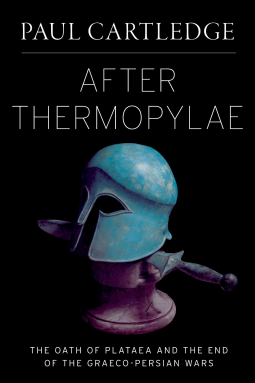
After Thermopylae
The Oath of Plataea and the End of the Graeco-Persian Wars
by Paul Cartledge
This title was previously available on NetGalley and is now archived.
Buy on Amazon
Buy on BN.com
Buy on Bookshop.org
*This page contains affiliate links, so we may earn a small commission when you make a purchase through links on our site at no additional cost to you.
Send NetGalley books directly to your Kindle or Kindle app
1
To read on a Kindle or Kindle app, please add kindle@netgalley.com as an approved email address to receive files in your Amazon account. Click here for step-by-step instructions.
2
Also find your Kindle email address within your Amazon account, and enter it here.
Pub Date Jun 04 2013 | Archive Date May 12 2013
Description
The Battle of Plataea in 479 BCE is one of world history's unjustly
neglected events. It decisively ended the threat of a Persian conquest
of Greece. It involved tens of thousands of combatants, including the
largest number of Greeks ever brought together in a common cause. For
the Spartans, the driving force behind the Greek victory, the battle was
sweet vengeance for their defeat at Thermopylae the year before. Why
has this pivotal battle been so overlooked?
In After Thermopylae, Paul Cartledge masterfully reopens one of the great puzzles of ancient Greece to discover, as much as possible, what happened on the field of battle and, just as important, what happened to its memory. Part of the answer to these questions, Cartledge argues, can be found in a little-known oath reputedly sworn by the leaders of Athens, Sparta, and several other Greek city-states prior to the battle-the Oath of Plataea. Through an analysis of this oath, Cartledge provides a wealth of insight into ancient Greek culture. He shows, for example, that when the Athenians and Spartans were not fighting the Persians they were fighting themselves, including a propaganda war for control of the memory of Greece's defeat of the Persians. This helps explain why today we readily remember the Athenian-led victories at Marathon and Salamis but not Sparta's victory at Plataea. Indeed, the Oath illuminates Greek anxieties over historical memory and over the Athens-Sparta rivalry, which would erupt fifty years after Plataea in the Peloponnesian War. In addition, because the Oath was ultimately a religious document, Cartledge also uses it to highlight the profound role of religion and myth in ancient Greek life. With compelling and eye-opening detective work, After Thermopylae provides a long-overdue history of the Battle of Plataea and a rich portrait of the Greek ethos during one of the most critical periods in ancient history.
In After Thermopylae, Paul Cartledge masterfully reopens one of the great puzzles of ancient Greece to discover, as much as possible, what happened on the field of battle and, just as important, what happened to its memory. Part of the answer to these questions, Cartledge argues, can be found in a little-known oath reputedly sworn by the leaders of Athens, Sparta, and several other Greek city-states prior to the battle-the Oath of Plataea. Through an analysis of this oath, Cartledge provides a wealth of insight into ancient Greek culture. He shows, for example, that when the Athenians and Spartans were not fighting the Persians they were fighting themselves, including a propaganda war for control of the memory of Greece's defeat of the Persians. This helps explain why today we readily remember the Athenian-led victories at Marathon and Salamis but not Sparta's victory at Plataea. Indeed, the Oath illuminates Greek anxieties over historical memory and over the Athens-Sparta rivalry, which would erupt fifty years after Plataea in the Peloponnesian War. In addition, because the Oath was ultimately a religious document, Cartledge also uses it to highlight the profound role of religion and myth in ancient Greek life. With compelling and eye-opening detective work, After Thermopylae provides a long-overdue history of the Battle of Plataea and a rich portrait of the Greek ethos during one of the most critical periods in ancient history.
Available Editions
| EDITION | Hardcover |
| ISBN | 9780199747320 |
| PRICE | $24.95 (USD) |



